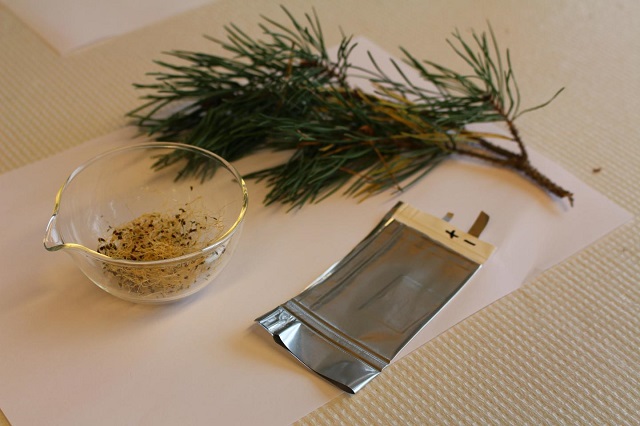 This is a prototype of the battery. Credit: Daniel Brandell
This is a prototype of the battery. Credit: Daniel Brandell
Scientists working at Ångström Laboratory at the Uppsala University, Sweden have developed a new environment-friendly battery prototype using resources from pine resin and alfalfa (lucerne seed) coupled with a smart recycling approach. Their concept could very well become an alternate option to present-day lithium batteries that have its share of environmental issues.
With the global extractable lithium supply becoming depleted, an alternative solution is required to meet future demands. The recovery of lithium from the inorganic materials used in modern battery manufacture is a challenge. Lithium batteries comprise other highly uncommon materials that cannot be replaced easily and need poisonous chemicals and huge energy inputs for recovery.
We think our discovery can open several doors to more environment-friendly, energy-efficient solutions for the batteries of the future.
Daniel Brandell, Associate Professor at the Department of Chemistry, Uppsala University
The new battery concept uses recoverable and renewable organic materials that match the energy content of existing lithium-ion batteries. These organic materials can be recycled with limited energy input and safe chemicals like water and ethanol. Although renewable materials have been used before to develop batteries, it is the recycling and recovery approach that is totally new. It is also possible to develop a new battery from a used one.
By adding a lot of biomaterials to extracted lithium taken from old batteries, the new battery developed by the Uppsala scientists was tested and found to provide almost 99% of the energy output. With further adjustments, the scientists believe that the energy output can be increased.

The research group at Uppsala University, Sweden. From left: Stéven Renault, Daniel Brandell and Kristina Edström. Image Credit: Anders Lund
It is a key achievement that the lithium can be recovered from these batteries in an environment-friendly, simple manner.
References and Further Reading